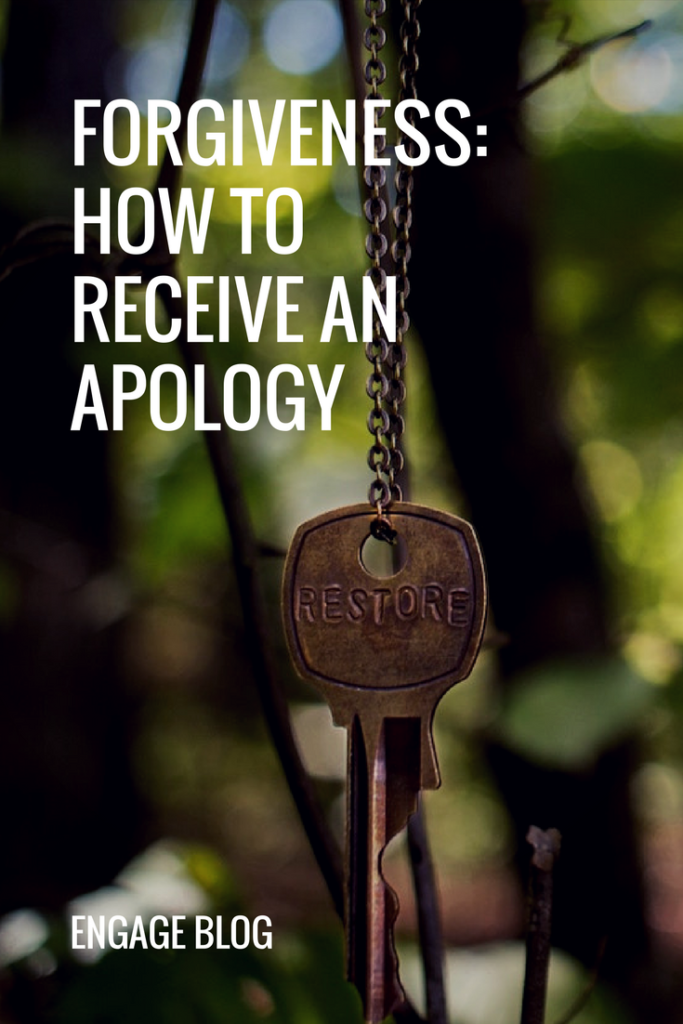Giving an apology is important. But the key to restoring a damaged relationship is forgiveness.
Hearing “I’m Sorry”
Just before the end of my senior year of high school, someone hurt me badly.
It wasn’t just unkind. She was angry, and she condemned me. My skills and talents — useless. My contributions — meaningless. My personal worth — nonexistent.
I handled the situation as best as I could. I apologized for my part in our conflict. I reported what she’d said that crossed the line. I cried my eyes out. And I remember saying to my mom, “I just wish she’d apologize.”
Five years later, she did. It totally took me by surprise. But then she looked at me and waited.
Hearing An Apology
Apologies are important, and we have to give them correctly. But how do we respond to the person who’s making an apology to us?
- Retaliate. We can spew out the hurt we’ve suffered as a result of their actions. We can yell, pouring out all the hurt and shame you’ve felt.
- Withdraw. Maybe the hurt is so big and deep, we just shrink away from the apology. Turn and run. Pull all our hurt into ourselves and pretend it’s all okay. (It’s not, of course, but they apologized, so we can’t tell them that, right?)
- Nothing. Sometimes, we nod. Give a quick “It’s okay” just so the conversation stops. Let’s just leave it there, give it a wide berth, and keep on walking.
Retaliation might make us feel better for a moment. It feels good to give someone a dose of their own medicine. Withdrawing feels like self-protection. And Nothing, well, that lets us keep things looking good, on the surface at least.
What none of them actually do, however, is resolve the conflict.
Forgiveness is the Key
No matter the conflict, the real issue is a broken relationship. The individual vocabulary changes: a missing or misused item, hurtful words, casual disobedience, intentional disrespect. But the heart of every conflict is that the relationship has been broken.
Our greatest desire, then, should be to restore that relationship. To bring people back into harmony. To fix what has been broken.
That’s why a real apology can shift blame or demand a response at the wrong time. The goal is to restore the relationship, and that is impossible when both sides can’t come equally.
The book Enemies of the Heart describes how anger creates a debt equation between two people that says “you [the person who did the wrong] owe me.” And we do. When we hurt someone, we put ourselves in their debt. When the hurt is somehow measurable (I steal $20 from you), it’s fairly easy to restore the debt (I pay back the $20).
But what do we do about debts that cannot be paid back?
- The dad who leaves his family for another woman cannot pay back the decade of bedtimes and homework he misses out on.
- The worker who embezzles money cannot restore the jobs of the people who are let go because the business goes under.
- The friend who spread the lies cannot undo the damage to relationships and reputation that they caused.
Not every hurt is tangible, and those debts cannot be paid back.
Which means our only hope is forgiveness. To have the debt cancelled, erased.
It’s what we’re hoping for when we apologize. And the one who comes to us in honest repentance, giving a real apology, cannot pay what they owe either. We have to choose to forgive.
True Forgiveness
NOW. Forgiveness is not doing nothing (see above). It’s not saying “it’s okay.” It is NOT okay. Let me repeat that, it is not okay. The damage that was done, the debt that is owed, is real and must be acknowledged.
But we can say, “I forgive you.” To forgive is to erase the debt. To refuse to hold it over them any more. To walk away on equal footing. It might take years to trust that person again. You might never trust that person again. But you refuse to hold them accountable for that wound anymore. That’s forgiveness.
Of course, it isn’t easy. We want to hold onto the debt. We want them to pay. It hurts to let it go. It feels a bit unfair. But in truth, we need to do it.
First, it’s what Jesus did for us. Because of his sacrifice, he forgives our sins. He frees us from their weight. And the Bible says, “as far as the east is from the west” is how far God has removed our sins from us (Psalm 103:12).
Even more, it’s what Jesus asks of us. Because God has forgiven us of our sins, we are also to forgive others (Matthew 18).
Most of all, you gain more than you think from forgiveness.
Yes, forgiveness frees them from the debt. But it also frees you from the debt. Even if the relationship is permanently destroyed (the divorce is final, the job already lost), once you forgive, you don’t have to carry around the weight of being judge and jury anymore. You can live your life no longer bound to that toxic thing that tied you together. You can breathe again. You can be whole again.
The End of the Story
That day, she apologized. Her words had hurt me deeply. Even now, many years later, I am still learning not to believe the things she said to me. But I accepted her apology and forgave her. She owes me nothing. And I can call her my friend.
There are many hurts that remain, in my life and in yours. Our word, our behavior, our racial/religious/political divides have caused so much damage to our culture, our neighborhoods. But we can begin to restore those relationships with true apologies and forgiving hearts.
The purpose of an apology is to restore the relationship. Let’s start to offer them. The key to restoring the relationship is forgiveness. Let’s be willing to give that, too.




